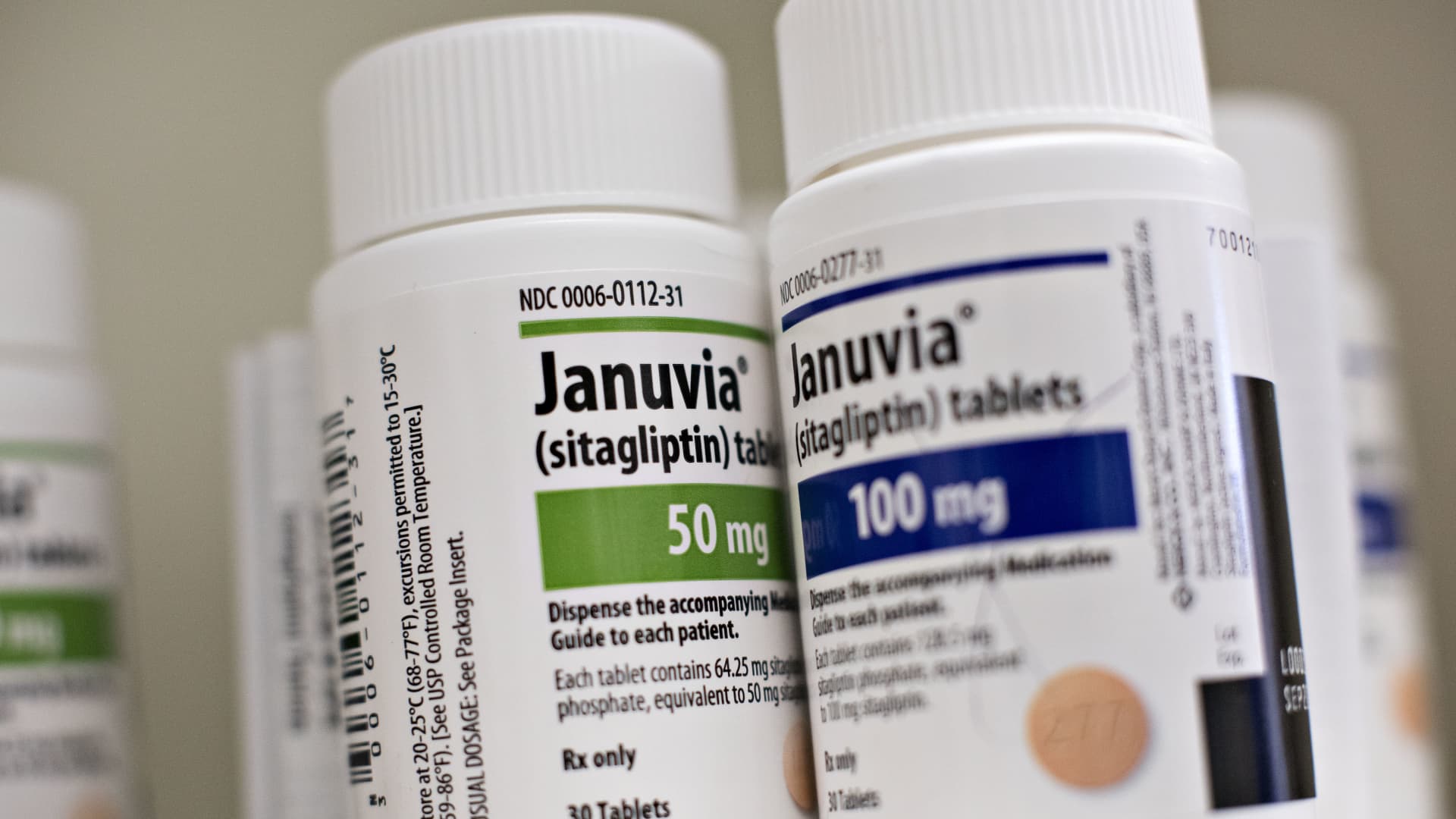Merck & Co. Inc.’s Januvia brand medication, used to treat Type 2 diabetes.
Daniel Acker | Bloomberg | Getty Images
Medicare is set to enter direct negotiations with the pharmaceutical industry this fall to determine drug prices, marking the first time in the program’s history.
The Centers for Medicare and Medicaid Services (CMS) will soon release a list of 10 drugs the agency aims to target for negotiations this year.
While the specific drugs have yet to be announced, several pharmaceutical companies have disclosed their expectations that four of their blockbuster medications will be selected.
Merck’s Januvia, a drug used for Type 2 diabetes, will be one of the drugs on the list, along with Merck’s cancer immune therapy treatment Keytruda in subsequent years.
Bristol-Myers Squibb and Johnson & Johnson anticipate negotiations for their blood thinners Eliquis and Xarelto, respectively. Abbvie expects its blood cancer drug Imbruvica to be targeted as well.
Additionally, an analysis published in March by the Journal of Managed Care and Specialty Pharmacy predicts that the following six drugs will likely be subjects of negotiations this year:
- Jardiance, made by Boehringer Ingelheim, used to treat heart failure
- Enbrel, made by Amgen, used to treat rheumatoid arthritis
- Symbicort, made by AstraZeneca, used to treat asthma
- Ibrance, made by Pfizer, used to treat breast cancer
- Xtandi, made by Astellas Pharma, used to treat prostate cancer
- Breo Ellipta, made by GSK, used to manage pulmonary disease
Surge in list prices
The forthcoming negotiations are a key part of the Biden administration’s strategy to reduce drug costs, as prices of Medicare’s top 25 drugs have more than tripled on average since their initial introduction in the U.S. market, surpassing the inflation rate significantly.
AARP, a prominent lobbying group for people aged 50 and older, strongly supports the Medicare drug price negotiation program, highlighting the need for action. According to AARP’s analysis, the list price of Januvia has increased by 275% since 2006, while Eliquis, Xarelto, and Imbruvica have seen jumps of 124%, 168%, and 108%, respectively.
These price hikes far exceed the corresponding inflation rates, ranging from 31% to 50%, as reported by AARP. The revenue generated by these drugs is substantial, with Merck, Bristol Myers Squibb, Johnson & Johnson, and Abbvie all benefiting significantly.
AARP emphasizes that Medicare beneficiaries, who typically take multiple prescription drugs each month, face increasing out-of-pocket costs that can be difficult to afford.
In fact, a study published in May revealed that one in five older adults affected by high drug prices resort to measures such as not filling prescriptions or skipping doses in order to save money.
Industry aims to block negotiations
The pharmaceutical industry has filed numerous lawsuits in an attempt to halt the negotiations, arguing that the program violates their property rights and poses a threat to their profits and future drug development.
Bristol Myers Squibb, Johnson & Johnson, Merck, the U.S. Chamber of Commerce, and the Pharmaceutical Research and Manufacturers of America have all filed separate lawsuits in federal district courts.
Legal experts suggest that the companies are pursuing multiple lawsuits across the country to increase the likelihood of the Supreme Court ultimately deciding on the matter.
While the list of 10 drugs subject to negotiations will be published by September, there is growing uncertainty about whether the negotiations will proceed as scheduled.
The U.S. Chamber of Commerce has requested a federal judge in Ohio to block the program before October 1, although AARP’s legal team believes convincing the judge in favor of the pharmaceutical companies will be challenging.
AARP’s primary goal is to protect the integrity of the Medicare program for the benefit of all while ensuring that older and vulnerable individuals do not have to make difficult choices between paying for essential drugs or meeting other basic needs.
The manufacturers included in the negotiations must sign agreements to participate by October 1, 2023. CMS will then present its initial price offer in February 2024, followed by a counteroffer from the manufacturers.
The negotiations will conclude in August 2024, and the reduced prices will become effective in January 2026.
Denial of responsibility! VigourTimes is an automatic aggregator of Global media. In each content, the hyperlink to the primary source is specified. All trademarks belong to their rightful owners, and all materials to their authors. For any complaint, please reach us at – [email protected]. We will take necessary action within 24 hours.


